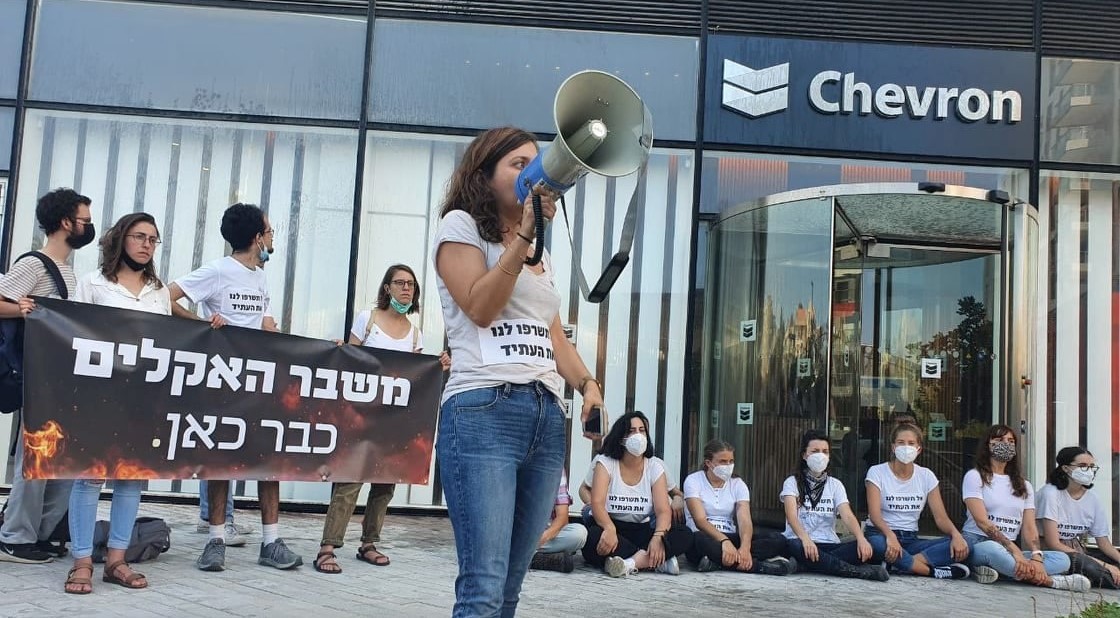A government report published on Monday, August 30, discloses that Israel’s methane emissions, which have more than 80 times the warming power of carbon dioxide, are much higher than world averages.
In its annual report on pollution and global warming gas emissions, the Environmental Protection Ministry states that during 2020 the 570 largest factories Israel cost the state some NIS 12.9 billion ($4 billion) in damages to public health and the environment, and that Israel’s emissions of greenhouse gases are higher than world averages. The report’s findings are based on data reported by the big companies themselves that are involved in the fields of energy, chemicals, metals, food and beverages, waste and wastewater treatment and intensive animal farming. In addition, emissions of carcinogens or suspected carcinogens from factories in Israel increased by 14% in 2020 compared with the previous year.

“Climate crisis is here”: Israeli environmental activists demonstrate in front of the Israeli headquarters of the US Chevron Oil Company in Herzliya, last Wednesday, August 25, 2021. (Photo: Extinction Rebellion Israel)
The report is the second to assess the external, or indirect, costs of these emissions according to criteria set by the Organization for Economic Co-operation and Development (OECD). These costs include, for example, providing hospital treatment to people with pollution-related diseases, or cleaning up a river that has been contaminated by industrial waste.
The leap in carcinogenic emissions comes from benzene discharges at the privatized Rotem Amfert plant in the south owned by Israel Chemicals Ltd. which produces fertilizers, and from two factories in Ashdod along the southern coast. Emissions were also up at another privatized factory, Adama, which produces agricultural chemicals. In 2017, Adama Agricultural Solutions Ltd. was acquired by Hubei Sanonda Co. Ltd., a Chinese agro-chemical producer and partially owned subsidiary of the state-owned ChemChina.
Fuel Leak from Major Pipeline
A fuel leaked from a major pipeline was discovered on Monday, August 30, along Israel’s southern coast, causing soil pollution and sounding alarm bells for Environmental Protection Ministry officials and environmental activists.
The leak took place in the vicinity of the Mediterranean Sea near the city of Ashkelon, just north of the Gaza Strip. Urgent engineering repairs were carried out along the pipeline overnight to replace the leaking section of pipe which is owned and operated by the state-owned Europe-Asia Pipeline Company (EAPC). About 100 cubic meters of fuel escaped from the pipe, contaminating around 800 tons of soil covering an area of approximately 3,000 square meters. The polluted soil was removed from the area. Despite the rapid repairs, the Environmental Protection Ministry views the incident as particularly egregious because officials say it demonstrates the far worse potential environmental risk posed by transporting fuel via this pipeline.
The incident comes at an awkward timing for the company after an environmental risk survey it ordered earlier this year downplayed the potential environmental damage a serious oil spill could wreak in the Gulf of Eilat or the Mediterranean Sea and concluded that the threat of environmental damage was “negligible.” The survey came as a response to a High Court petition filed by environmental groups against a deal with the United Arab Emirates that would have seen oil transported from the Gulf to Eilat port via tankers, then moved by the pipeline through mainland Israel to the port of Ashkelon, from where it would be shipped to Europe. The agreement, which came following Israel and the UAE’s decision to normalize ties last year under the hegemony of US imperialism, was put on ice last month after the ministry decided to reject the risk survey and postpone any further steps until the government discusses the controversial memorandum of understanding the EAPC signed with the Gulf kingdom last October.
Related:


